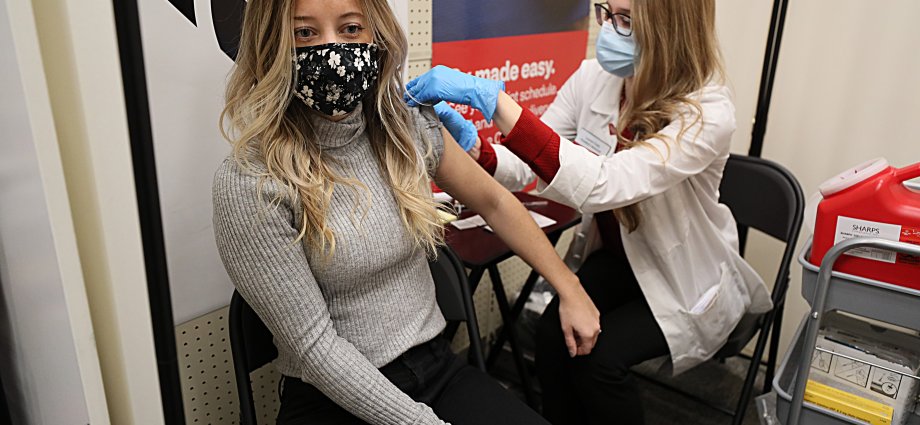
Teacher Jennifer Hogan, a reading specialist in the Lynn Public Schools, had tears in her eyes when she got her COVID-19 vaccine at a CVS in Medford, MA on March 5, 2021.
Suzanne Kreiter | Boston Globe | Getty Images
CVS Health said Wednesday that demand for Covid vaccines and at-home Covid tests lifted overall store sales, helping the company top expectations for fourth-quarter earnings.
Shares fell more than 2% in premarket trading, as it reiterated its fiscal 2022 forecast.
The pharmacy chain and health-care company administered more than 8 million Covid tests and more than 20 million Covid vaccines in the fourth quarter, a significant jump from the nearly 17 million vaccines administered in the second quarter, and the 11.6 million that it gave in the third.
CVS has played a key role in the country’s response to the pandemic, along with competitor Walgreens Boots Alliance. Covid-related services have led to a boost in its retail and pharmacy business over the past year, particularly during the holiday quarter when consumers sought out booster shots and at-home tests ahead of gatherings.
Here’s what the company reported for the three-month period ended Dec. 31, compared with what analysts were expecting, based on a survey of analysts by Refinitiv:
- Earnings per share: $1.98 adjusted vs. $1.93 expected
- Revenue: $76.60 billion vs. $75.67 billion expected
Led by its new CEO Karen Lynch, CVS is expanding into more health-care services and pledging to use its scale to reduce costs and improve outcomes. The company is combining the different parts of its business: A huge national footprint of drugstores; its insurance business, Aetna; and pharmacy benefits manager, Caremark.
CVS reported fiscal fourth-quarter net income of $1.31 billion, or 99 cents per share, up from $973 million, or 74 cents per share, a year earlier.
The company said its net income from continuing operations was 98 cents. But it earned $1.98 per share, after adjustments, which was more than the $1.93 per share expected by analysts surveyed by Refinitiv.
CVS is overhauling its stores to match that health-care focus. Starting this spring, it plans to shutter about 900 locations – or 9% of the company’s roughly 10,000 U.S. stores – over the next three years.
The company’s operating income in the quarter dropped by nearly 12%, with much of that coming from a store impairment charge of about $1.4 billion as it wrote down leases for property and equipment to plan for those closures.
Total revenue for the period rose to $76.60 billion from $69.55 billion a year earlier, exceeding expectations of $75.67 billion.
Same-store sales at CVS rose by 13.4% in the fourth quarter. CVS said it saw higher prescription volumes, front-of-store sales and vaccinations at its stores during the latest period. It said it also benefited from the growth of specialty pharmacy.
Across CVS’ business segments, retail/long-term care revenue grew 12.7% to $27.11 billion, health care benefits revenue increased 8.4% to $20.7 billion and pharmacy services revenue rose 8.2% to $39.34 billion.
Covid vaccinations, diagnostic tests and sales of over-the-counter test kits accounted for about 40% of the increase in the retail segment’s revenue.
In the coming fiscal year, CVS said it expects earnings from continuing operations to range between $7.04 to $7.24 per share and adjusted earnings to range between $8.10 to $8.30 per share.
Shares of CVS are up 51% over the past 12 months and touched a 52-week high on Tuesday. Shares closed Tuesday at $110.83, up 1.3%. The company’s market value is $146.30 billion.











